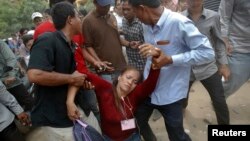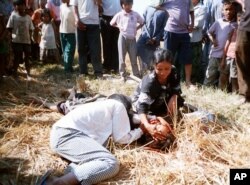Videos of a mob beating last week went viral on Cambodian social media as police quelled the violence.
The videos show a man attempting to flee from the scene of an accident that left three dead on Phnom Penh's Monivong Boulevard. A mob pursues him as he drives on the wrong side of the street before being dragged from his car and beaten until police arrive.
The driver, hospitalized with serious injuries, survived.
On Friday, villagers armed with machetes circled the home of a fortune teller, who they suspected of using black magic to spread illnesses. Police and local officials in Kompong Speu province quieted the mob.
The victim and his wife requested relocation to another province.
Such events are not uncommon in Cambodia, where hit-and-run drivers, petty thieves, suspected sorcerers and others are frequently subjected to mob justice. Or as the U.S. Department of State, Bureau of Diplomatic Security put it, "Public perception regarding the responsiveness and abilities of the Cambodian National Police and justice system often leads to civilian vigilante-style justice … ."
Local rights group Licadho reported that two people have been killed in mob attacks this year. Mobs killed four people in 2016.
Lack of accountability
Experts who spoke to VOA Khmer said that a major factor driving mob beatings and killings continues to be a lack of accountability and perceived injustice in society.
Since the overthrow of the Khmer Rouge by Vietnam in 1979, and subsequent occupation by Vietnam until 1991, repairing Cambodia's justice system has been the focus of innumerable international commissions, studies and aid groups.
A 2011 study by California's UC Berkeley School of Law suggested that most Cambodians doubt ordinary people will receive fair treatment by police or a fair trial. Only 36 percent said that they trusted the court system, while just 37 percent said they trusted the judges. Almost 60 percent said they did not believe that justice is the same for everyone.
Also straining the newly woven social fabric is a doubling in population between 1980 and 2015, a widening income rift between rural and urban populations — and in cities, a growing discrepancy between a small elite and everyone else.
The result, according to Ear Chariya, an independent traffic safety expert, is that "the people lose trust in the authorities and choose to find justice by their own hands" because hit-and-run drivers were rarely seen to receive the proper punishment.
He added that the lack of police action had created a vicious cycle where the chance of mob killings had created a justification for drivers to flee the scene of accidents.
"If they escape the scene, there can't be any repercussions," he said.
Long history
Mob justice is not a new phenomenon. In 2005, Peter Leuprecht, then-U.N. special representative for human rights to Cambodia, noted that more than 100 people had been killed by mobs in the previous five years, often with the complicity of officials. Although there may be fewer instances of mob justice now, there is little effort by authorities to track down those involved in such attacks and no official records of mob attacks are maintained.
Yang Kim Eng, head of the People's Center for Development and Peace, said that because a crime had been committed, it was not justified to respond with violence.
"The bystanders who beat him are also committing a crime," he said. "When the public becomes the judge, society falls into chaos."
"Poverty, migration and other social insecurities and pressures could make people feel frustration and easily lose control of their anger and patience," he added.
Sok Eysan, ruling Cambodian People's Party spokesman, said while the government did what it could to punish offenders, it was impossible to prevent every mass outburst of anger.
"People are not gods who can always calm their anger," he said.
This story originated on the VOA Cambodia service.





